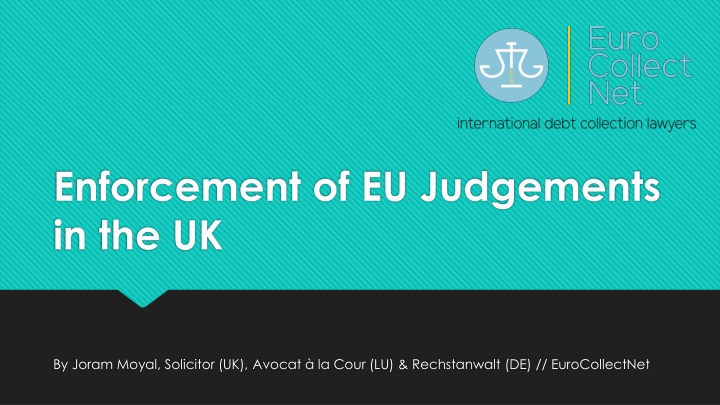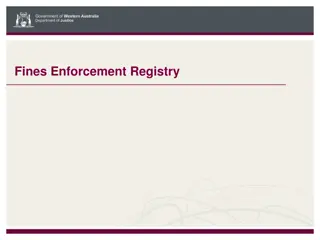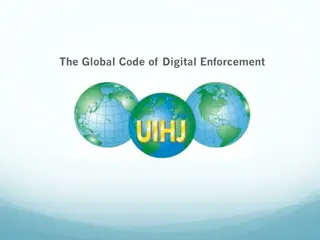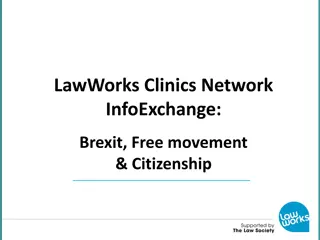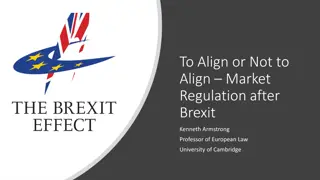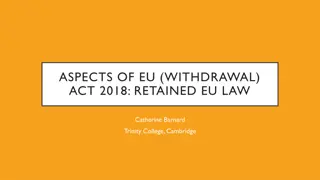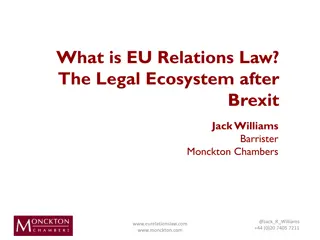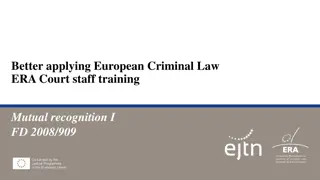Enforcement of EU Judgements in the UK Post-Brexit: Legal Implications & Options
Post-Brexit, the UK's enforcement of EU judgments faces changes due to the absence of EU jurisdiction rules. The transition and withdrawal agreements have implications on contract and non-contractual claims, while UK courts continue recognition under Brussels Recast. Alternative enforcement options post-Brexit include Hague Conventions and surviving bilateral agreements.
Download Presentation

Please find below an Image/Link to download the presentation.
The content on the website is provided AS IS for your information and personal use only. It may not be sold, licensed, or shared on other websites without obtaining consent from the author.If you encounter any issues during the download, it is possible that the publisher has removed the file from their server.
You are allowed to download the files provided on this website for personal or commercial use, subject to the condition that they are used lawfully. All files are the property of their respective owners.
The content on the website is provided AS IS for your information and personal use only. It may not be sold, licensed, or shared on other websites without obtaining consent from the author.
E N D
Presentation Transcript
Enforcement of EU Judgements in the UK By Joram Moyal, Solicitor (UK), Avocat la Cour (LU) & Rechstanwalt (DE) // EuroCollectNet
Before Brexit EU jurisdiction rules currently governed by the Brussels I Regulation (recast) 1215/2012, also known as the Judgments Regulation or the Brussels Recast Regulation. Previously: 2001 Brussels Regulation 1968 Brussels Convention (UK law by the Civil Jurisdiction and Judgments Act 1982) Various ad hoc bilateral agreements on recognition and enforcement (UK law under Administration of Justice Act 1920 and Foreign Judgments (Reciprocal Enforcement) Act 1933) Also: 2007 Lugano Convention, replacing 1988 Lugano Convention (now Norway, Iceland and Switzerland) similar to 2001 Brussels Regulation EU/Denmark Agreement (Denmark)
After Brexit The UK is not member of Convention of 21 December 2007 on jurisdiction and the recognition and enforcement of judgments in civil and commercial matters ( Lugano Convention ). The EU-UK Trade and Cooperation Agreement ( TCA ) of December 24, 2020 does not include any provisions regarding cross-border disputes. The European rules no longer apply in the UK
Withdrawal Agreement, Article 66: choice of law Contract claims: The Rome I Regulation 593/2008 continues to apply in respect of contracts concluded before the end of the transition period TRANSITIONAL ARRANGEMENTS Non-contractual claims: The Rome II Regulation 864/2007 continues to apply to non- contractual liability where the event giving rise to damage occurred before the end of the transition period
UK options for enforcement post-Brexit Brexit transitional provisions ended 31 December 2021 Proceedings begun may continue and will be executable under Brussel Recast England & Wales courts will continue to recognise judgments from cases begun before the end of transition, and will continue to recognize court settlements and authentic instruments approved before end of transition English courts will continue to respect an express choice of the law of an EU member state
Conventions on enforcement 2015 Hague Convention on Choice of Court, Article 8 (where it applies) Maybe, in the future, 2019 Hague Convention on the Recognition and Enforcement of Foreign Judgments in Civil or Commercial Matters (2 signatories so far!) Some old bilateral treaties and agreements survive, which apply only in respect of money judgments query whether they will be reciprocally revived: Foreign Judgments (Reciprocal Enforcement) Act 1933: Austria, Belgium, France, Germany, Italy, the Netherlands, Norway only Norway confirmed on 13 October 2020 it would revive the old treaty (with amendments) Administration of Justice Act 1920: Cyprus Otherwise this is an EU competence so bilateral agreements in principle not available with EU member states Lugano Convention (UK has applied to join Lugano Convention would ensure that judgments in cross- border civil and commercial disputes can be enforced across borders - refused y EU Member States)
Hague 3 rules 01 02 03 The chosen court must in principle hear the case (Art. 5); Any court not chosen must in principle decline to hear the case (Art. 6); and Any judgment rendered by the chosen court must be recognised and enforced in other Contracting States, except where a ground for refusal applies (Arts 8 and 9)
Only exclusive choice of court agreement. Enforcement under the Hague Convention Only judgments in civil and commercial matters Excluded: family law, wills and succession, insolvency and arbitration but also consumer, employment and insurance matters, rights in rem in land, and company law matters. Default judgments are covered as well as costs determination and non-money judgments, but interim protective measures or procedural rulings are not
Do you have a judgment in your favour against a party in England and Wales? Checklist When were the proceedings started?. Which jurisdiction do you want to enforce the judgment in? Is the jurisdiction a contracting state to the Hague Convention on Choice of Court Agreements? a) If so, was the judgment awarded on the basis of an exclusive choice of court agreement? b) Further analysis of the Convention is required to determine whether it is applicable. If not, does the UK have a bilateral arrangement with the jurisdiction relating to reciprocal recognition and enforcement of judgments? If not, the relevant law will be the private international law of that jurisdiction.
Thank you! Joram Moyal j.moyal@moyal-simon.com
